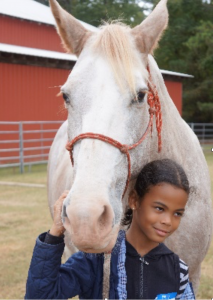Connections are Essential | Equine Therapy
What happens when two non-profits come together to make a difference in the lives of individuals who struggle? Magic happens. For Family Patterns Matter, a non-profit designed to focus on generational patterns in families and Waypoint Ranch’s Peace at Home Project, who serves families experiencing multigenerational trauma, coming together was a natural fit. Acknowledging that every situation and individual is unique, The Peace at Home Project uses effective evidence based treatments with holistic alternative therapies on a working ranch. Family Patterns Matter works with families who are underserved and children who are at risk for failure in life and school.
The definition of magic in Wikipedia states: believed to have supernatural powers. The use of paranormal methods to manipulate who is unreachable and doesn’t participate. It is actually the science of (the brain) connections and relationships and how those connections determine who we are and who we become.
Pictured are Molly, a horse destined for slaughter, and Jia (Linda fill in last name) demonstrating their connection.
The human brain is a social organ shaped by experience. When children’s brains are shaped by stressful experiences, problems with anger, addiction, and even criminal activity can result. As children grow up and get a more stable brain, these early stressful experiences can cause changes in the brain that make them hyper-alert to danger, and less aware of the pleasures of everyday life.
The relationship between the client and their horse is the foundation for healing and every interaction between the horse and human, whether on the ground or mounted, has a therapeutic purpose. The entire therapeutic process centers around how the client builds the relationship with their horse and the inner changes that must occur in the process of creating the desired connection. Those changes must be genuine or they will not achieve the desired results. The client’s ability to create a rewarding, satisfying, safe and predictable relationship with their horse is brought about by their growing ability to self-regulate internally and to challenge their dysfunctional beliefs surrounding relationships. This process is intended to create actual physiological changes in neuro-functioning that affect the client’s behavior in ALL relationships. We allow the client to build a relationship based on their existing schema and patterns of behavior and, as they come to discover these don’t produce the kind of relationship they want, we guide them in thinking through and applying sound relationship principles that apply equally well in the round pen as in other arenas of their lives. Ultimately, this work results in the client being able to control his or herself and relating with others in a way that allows them to do the same. These are the fundamental principles of Natural Lifemanship Trauma Focused Equine Assisted Psychotherapy.
When a family reaches out because they have tried what has been offered, become discouraged with the system and feel lost, we step in and offer programs with proven results through trauma informed counseling and Trauma Focused Equine Assisted Psychotherapy. Specifically:
*Accelerated Resolution Therapy (ART) designed for a therapist to guide the individual through specific scenes or events in the past that may be hidden away. There are ways that can help overcome fears, phobias and other problem behavior.
*Trauma Focused Equine Assisted Psychotherapy (TF-EAP) is based on contemporary medical research that explains the physiological and psychological impact of chronic stress and traumatic experiences on human development beginning in utero and throughout the lifespan. TF-EAP views and treats psychological and behavioral disorders through a trauma lens by intentionally using horse physiology to regulate human physiology, and horse psychology to heal human psychology.
While we cannot control our external circumstances or the actions of others, we can always manage how we respond internally and externally to adversity (given that we’ve sufficiently developed that ability). As infants and children, we begin to develop this ability through the relationship with our caregivers. As older youth and adults, we continually develop it through practice, which is greatly facilitated by supportive relationships with others. This is the cornerstone of resilience.
Email: familypatternsmatter@gmail.com

